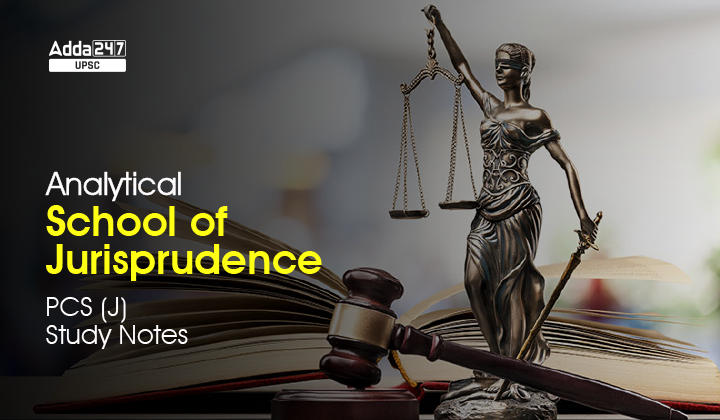Table of Contents
Analytical School of Jurisprudence
As a matter of technicality, there are three distinct areas of law. The differing theoretical premises of several schools of legal thought are the basis for this segmentation. Since the 19th century, the reach of the law regarding urgent situations has grown substantially. It has been viewed in recent times as the science of social regulation for human behaviour, which has increased the need for a comprehensive legal philosophy developed by proponents of diverse schools.
Salmond classified Jurisprudence into the analytical, historical, and ethical schools. The foundational tenet of the analytical school of jurisprudence is the connection between law and the structure of a state, as expressed in the legal maxim “Ubi civitas ibi lex,” which translates as “where there is State, there will not be anarchy.” The primary idea of the Analytical school of law is to work within the framework of the existing legal system. The Analytical school argues that the sovereign’s direction may be seen in the law. Therefore, analytical schools are often known as imperative schools.
Advocates of Analytical School of Jurisprudence
Jeremy Bentham on Analytical School of Jurisprudence
A new period in the development of English legal philosophy began with Bentham (1748-1832), who is often regarded as the father of positivism as we know it today and who established the groundwork for the Analytical school of Jurisprudence. Bentham argued that the only way to improve the substantive law was to analyse it and make structural changes. While’sovereignty and command’ were essential ideas in Bentham’s theory, the values held by different societies informed his understanding of justice.
Utilitarian individualism is the name given to Bentham’s philosophy. He described law as “an assemblage of rights, declaratory of violation conceived or adopted by a sovereign in a state,” which indicates that law is an expression of the will of the sovereign in a certain nation-state. He argues that the sovereign’s will—whether expressed through his own laws or those of his predecessors—is the ultimate source of law.
Numerous critiques have been levelled at Bentham’s utilitarianism. Two of Friedmann’s main criticisms apply here. To begin, Bentham overestimated the authority of the legislator and undervalued the necessity for individual discretion and flexibility in application of law in an attempt to reconcile materialism and idealism. Second, there is no harmony between private and public concerns in his framework. In addition, Bentham’s hedonistic calculus shows that utilitarianism is not based on the premise that pleasure and suffering are the only criteria by which to evaluate the efficacy of a law.
John Austin on Analytical School of Jurisprudence
According to Austin, law is “a rule put down for the guiding of an intellectual being by an intelligent being having power over him.” God’s law, human law, and positive law are all included in his definition of “proper law.” There are two forms of ‘incorrectly’ titled laws: laws by analogy and laws by metaphor. According to Austin, “Positive morality” includes both laws imposed by analogy, such as fashion laws, and those imposed by men (as political superiors) or in pursuit of a legal right. He went on to say that the state does not approve of the unjust regulations.
Bryce has already criticised major tenets of Austin’s theory of positive law, calling it erroneous and arguing that it adds little to the conversation about law.
Hart on Analytical School of Jurisprudence
Many people consider Professor Hart (1907) to be the most influential British positivist of the modern period. In his influential book “The Concept of Law,” he argued against Austin’s position. Hart noted that “law consists of rules with broad applicability and non-optional nature, yet which are subject to formalisation, legislation, and adjudication.” In his view, law is nothing more than a collection of social norms (rules resulting from social pressure) that have been codified into statutes and court orders. Generally speaking, “publicly ascertainable regulations” are what we mean when we say “law.” Hart argues that the law and a legal system are interchangeable terms.
Salmond on Analytical School of Jurisprudence
Although Salmond (1862-1924) shared the backing of the Analytical School of Jurisprudence, he differed from the majority of other jurists in numerous significant respects.
He defines “Imperative law” as “a precept or rule of action imposed upon man by the same authority which imposes respect to it.” In other words, an imperative law is a regulation or directive that is imposed by a higher authority. While he accepts that all rules, regardless of their source, are part of the law, he argues only that the courts should recognise them.
न्यायशास्त्र का विश्लेषणात्मक स्कूल
तकनीकी रूप से, कानून के तीन अलग-अलग क्षेत्र हैं। कानूनी विचार के कई स्कूलों के अलग-अलग सैद्धांतिक परिसर इस विभाजन का आधार हैं। 19वीं सदी के बाद से, तत्काल स्थितियों के संबंध में कानून की पहुंच में काफी वृद्धि हुई है। इसे हाल के दिनों में मानव व्यवहार के लिए सामाजिक नियमन के विज्ञान के रूप में देखा गया है, जिसने विविध विद्यालयों के समर्थकों द्वारा विकसित एक व्यापक कानूनी दर्शन की आवश्यकता को बढ़ा दिया है।
सैल्मंड ने न्यायशास्त्र को विश्लेषणात्मक, ऐतिहासिक और नैतिक स्कूलों में वर्गीकृत किया। न्यायशास्त्र के विश्लेषणात्मक स्कूल का मूलभूत सिद्धांत कानून और राज्य की संरचना के बीच संबंध है, जैसा कि कानूनी कहावत “यूबी सिविटास इबी लेक्स” में व्यक्त किया गया है, जिसका अनुवाद “जहां राज्य है, वहां अराजकता नहीं होगी।” एनालिटिकल स्कूल ऑफ लॉ का प्राथमिक विचार मौजूदा कानूनी प्रणाली के ढांचे के भीतर काम करना है। विश्लेषणात्मक स्कूल का तर्क है कि कानून में संप्रभु की दिशा देखी जा सकती है। इसलिए, विश्लेषणात्मक स्कूलों को अक्सर अनिवार्य स्कूलों के रूप में जाना जाता है।
न्यायशास्त्र के विश्लेषणात्मक स्कूल के अधिवक्ता
न्यायशास्त्र के विश्लेषणात्मक स्कूल पर जेरेमी बेंथम
अंग्रेजी कानूनी दर्शन के विकास में एक नई अवधि बेंथम (1748-1832) के साथ शुरू हुई, जिसे अक्सर प्रत्यक्षवाद के पिता के रूप में माना जाता है जैसा कि हम आज जानते हैं और जिन्होंने न्यायशास्त्र के विश्लेषणात्मक स्कूल के लिए आधारभूत कार्य स्थापित किया। बेंथम ने तर्क दिया कि मौलिक कानून में सुधार का एकमात्र तरीका इसका विश्लेषण करना और संरचनात्मक परिवर्तन करना था। जबकि ‘संप्रभुता और आदेश’ बेंथम के सिद्धांत में आवश्यक विचार थे, विभिन्न समाजों द्वारा रखे गए मूल्यों ने न्याय की उनकी समझ को सूचित किया।
उपयोगितावादी व्यक्तिवाद बेंथम के दर्शन को दिया गया नाम है। उन्होंने कानून को “अधिकारों का एक संयोजन, एक राज्य में एक संप्रभु द्वारा कल्पना या अपनाया उल्लंघन की घोषणा” के रूप में वर्णित किया, जो इंगित करता है कि कानून एक निश्चित राष्ट्र-राज्य में संप्रभु की इच्छा की अभिव्यक्ति है। उनका तर्क है कि संप्रभु की इच्छा – चाहे वह अपने स्वयं के कानूनों के माध्यम से व्यक्त की गई हो या उसके पूर्ववर्तियों की – कानून का अंतिम स्रोत है।
बेंथम के उपयोगितावाद की कई आलोचनाएँ की गई हैं। फ्रीडमैन की दो मुख्य आलोचनाएँ यहाँ लागू होती हैं। शुरू करने के लिए, बेंथम ने विधायक के अधिकार को कम करके आंका और भौतिकवाद और आदर्शवाद को समेटने के प्रयास में कानून के आवेदन में व्यक्तिगत विवेक और लचीलेपन की आवश्यकता को कम करके आंका। दूसरा, उनके ढांचे में निजी और सार्वजनिक सरोकारों के बीच कोई सामंजस्य नहीं है। इसके अलावा, बेंथम के सुखवादी कलन से पता चलता है कि उपयोगितावाद इस आधार पर आधारित नहीं है कि सुख और दुख ही एकमात्र मानदंड हैं जिसके द्वारा किसी कानून की प्रभावकारिता का मूल्यांकन किया जाता है।
न्यायशास्त्र के विश्लेषणात्मक स्कूल पर जॉन ऑस्टिन
ऑस्टिन के अनुसार, कानून “एक ऐसा नियम है जो एक बुद्धिमान व्यक्ति द्वारा उस पर अधिकार रखने वाले एक बुद्धिजीवी व्यक्ति के मार्गदर्शन के लिए निर्धारित किया जाता है।” परमेश्वर की व्यवस्था, मानवीय कानून, और सकारात्मक कानून सभी उसकी “उचित कानून” की परिभाषा में शामिल हैं। ‘गलत तरीके से’ शीर्षक वाले कानून के दो रूप हैं: सादृश्य द्वारा कानून और रूपक द्वारा कानून। ऑस्टिन के अनुसार, “सकारात्मक नैतिकता” में सादृश्य द्वारा लगाए गए दोनों कानून शामिल हैं, जैसे कि फैशन कानून, और जो पुरुषों द्वारा (राजनीतिक वरिष्ठों के रूप में) या कानूनी अधिकार की खोज में लगाए गए हैं। उन्होंने आगे कहा कि राज्य अन्यायपूर्ण नियमों को स्वीकार नहीं करता है।
ब्रायस ने पहले ही ऑस्टिन के सकारात्मक कानून के सिद्धांत के प्रमुख सिद्धांतों की आलोचना की है, इसे गलत बताया और तर्क दिया कि यह कानून के बारे में बातचीत में बहुत कम जोड़ता है।
न्यायशास्त्र के विश्लेषणात्मक स्कूल पर हार्ट
बहुत से लोग प्रोफेसर हार्ट (1907) को आधुनिक काल के सबसे प्रभावशाली ब्रिटिश प्रत्यक्षवादी मानते हैं। अपनी प्रभावशाली पुस्तक “द कॉन्सेप्ट ऑफ लॉ” में उन्होंने ऑस्टिन की स्थिति के खिलाफ तर्क दिया। हार्ट ने नोट किया कि “कानून में व्यापक प्रयोज्यता और गैर-वैकल्पिक प्रकृति वाले नियम शामिल हैं, फिर भी जो औपचारिकता, कानून और निर्णय के अधीन हैं।” उनके विचार में, कानून सामाजिक मानदंडों (सामाजिक दबाव से उत्पन्न नियम) के संग्रह से ज्यादा कुछ नहीं है, जिन्हें विधियों और अदालती आदेशों में संहिताबद्ध किया गया है। सामान्यतया, जब हम “कानून” कहते हैं, तो “सार्वजनिक रूप से सुनिश्चित विनियम” का अर्थ होता है। हार्ट का तर्क है कि कानून और कानूनी प्रणाली विनिमेय शब्द हैं।
न्यायशास्त्र के विश्लेषणात्मक स्कूल पर सैल्मंड
हालांकि सैल्मंड (1862-1924) ने एनालिटिकल स्कूल ऑफ ज्यूरिस्प्रुडेंस का समर्थन साझा किया, लेकिन वह कई महत्वपूर्ण मामलों में अन्य न्यायविदों के बहुमत से अलग था।
वह “अनिवार्य कानून” को “एक ही अधिकार द्वारा मनुष्य पर लगाए गए एक नियम या कार्रवाई के नियम के रूप में परिभाषित करता है जो इसे सम्मान देता है।” दूसरे शब्दों में, एक अनिवार्य कानून एक विनियमन या निर्देश है जो एक उच्च अधिकारी द्वारा लगाया जाता है। जबकि वह स्वीकार करता है कि सभी नियम, उनके स्रोत की परवाह किए बिना, कानून का हिस्सा हैं, उनका तर्क है कि अदालतों को उन्हें मान्यता देनी चाहिए।
FAQs ANALYTICAL SCHOOL OF JURISPRUDENCE
- What is Analytical School of Jurisprudence?
Ans: Analytical legal theory centres on the idea that existing law should be worked within. The Analytical school posits that the sovereign’s direction can be derived from the law.
2. Salmond has classified Jurisprudence into how many schools?
Ans: Salmond classified Jurisprudence into the analytical, historical, and ethical schools.



 TSPSC Group 1 Question Paper 2024, Downl...
TSPSC Group 1 Question Paper 2024, Downl...
 TSPSC Group 1 Answer key 2024 Out, Downl...
TSPSC Group 1 Answer key 2024 Out, Downl...
 Cabinet Ministers of India 2024, New Cab...
Cabinet Ministers of India 2024, New Cab...







